Industrial Vending Machine Market
Industrial Vending Machine Market Size and Share Forecast Outlook 2025 to 2035
Industrial vending machine market is projected to grow from USD 3.6 billion in 2025 to USD 9.4 billion by 2035, at a CAGR of 10.1%. Coil will dominate with a 38.2% market share, while ppe will lead the product segment with a 41.5% share.
Industrial Vending Machine Market Forecast and Outlook 2025 to 2035
The global industrial vending machine market is projected to reach USD 9.4 billion by 2035, recording an absolute increase of USD 5.8 billion over the forecast period. The market is valued at USD 3.6 billion in 2025 and is set to rise at a CAGR of 10.1% during the assessment period.
Quick Stats for Industrial Vending Machine Market
- Industrial Vending Machine Market Value (2025): USD 3.6 billion
- Industrial Vending Machine Market Forecast Value (2035): USD 9.4 billion
- Industrial Vending Machine Market Forecast CAGR: 10.1%
- Leading Type in Industrial Vending Machine Market: Coil (38.2%)
- Key Growth Regions in Industrial Vending Machine Market: Asia Pacific, North America, and Europe
- Top Players in Industrial Vending Machine Market: Apex Industrial Technologies LLC, AutoCrib, Inc., MSC Industrial Direct Co., Inc., Brammer, IMC Group, SecuraStock, CribMaster, Fastenal Company, Airgas Inc., IVM, Inc.
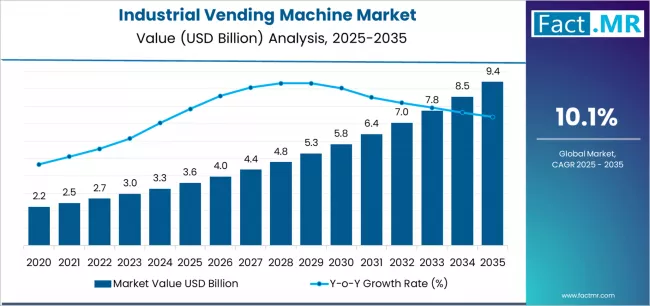
The market is expected to grow by approximately 2.6 times during the same period, supported by increasing emphasis on inventory optimization and just-in-time material availability across manufacturing facilities worldwide, driving demand for automated dispensing solutions and increasing investments in smart factory initiatives with integrated supply chain management capabilities across industrial operations and production environments globally.
Industrial facilities face mounting pressure to reduce inventory carrying costs while ensuring continuous production uptime and maintaining strict control over consumable usage, with modern industrial vending machine systems providing documented operational benefits including reduced inventory waste, enhanced tracking accuracy, and improved worker productivity compared to traditional manual distribution methods alone.
Rising adoption of Industry 4.0 technologies and expanding integration with enterprise resource planning systems enabling real-time inventory visibility create substantial opportunities for manufacturers and industrial distributors. However, high initial capital investment requirements and integration complexity with legacy systems may pose obstacles to widespread adoption across small and medium-sized enterprises.
The coil vending machine segment dominates market activity, driven by versatile dispensing capabilities and compatibility with diverse product categories including personal protective equipment and maintenance supplies across industrial environments worldwide. Facilities increasingly recognize the operational benefits of coil-based systems, with typical product offerings providing reliable dispensing mechanisms and cost-effective deployment options through established industrial distribution networks.
The PPE product segment demonstrates robust growth potential, supported by rising workplace safety regulations and comprehensive safety programs integrating automated dispensing for protective equipment in manufacturing facilities. Manufacturing emerges as the dominant end-use sector, reflecting extensive adoption of vending solutions for consumable management and operational efficiency optimization in production environments. China represents the fastest-growing market, driven by rapid industrial automation adoption and expanding manufacturing capacity supporting smart factory implementations.
Regional dynamics show China maintaining the fastest growth trajectory, supported by extensive manufacturing expansion and government initiatives promoting industrial automation across production sectors. India demonstrates strong growth potential driven by increasing manufacturing investments and expanding industrial infrastructure adopting modern inventory management approaches, while USA emphasizes operational excellence and lean manufacturing principles for inventory optimization.
Germany leads European growth through advanced manufacturing capabilities and Industry 4.0 integration, followed by UK supported by pharmaceutical and automotive sector adoption. The competitive landscape features moderate concentration with Apex Industrial Technologies LLC maintaining market leadership position at 11.4% market share, while specialized players including AutoCrib, MSC Industrial Direct, and Fastenal Company compete through comprehensive product portfolios and integrated software platforms across diverse industrial applications.
Industrial Vending Machine Market Year-over-Year Forecast 2025 to 2035
Between 2025 and 2029, the industrial vending machine market is projected to expand from USD 3.6 billion to USD 5.4 billion, resulting in a value increase of USD 1.8 billion, which represents 31.0% of the total forecast growth for the period. This phase of development will be shaped by rising demand for automated inventory management solutions addressing consumable tracking and usage monitoring, product innovation in IoT-enabled vending systems with cloud-based analytics and predictive replenishment capabilities, as well as expanding integration with manufacturing execution systems and enterprise resource planning platforms. Companies are establishing competitive positions through investment in software development partnerships, advanced sensor technologies, and strategic market expansion across manufacturing facilities, distribution centers, and industrial maintenance operations.
From 2029 to 2035, the market is forecast to grow from USD 5.4 billion to USD 9.4 billion, adding another USD 4.0 billion, which constitutes 69.0% of the overall expansion. This period is expected to be characterized by the expansion of specialized applications, including hazardous material dispensing systems and temperature-controlled storage solutions tailored for pharmaceutical and chemical industries, strategic collaborations between vending machine manufacturers and industrial distributors, and an enhanced focus on artificial intelligence integration and machine learning algorithms. The growing emphasis on sustainability initiatives and rising adoption of vendor-managed inventory models will drive demand for comprehensive automated dispensing solutions across diverse industrial sectors.
Industrial Vending Machine Market Key Takeaways
| Metric | Value |
|---|---|
| Market Value (2025) | USD 3.6 billion |
| Market Forecast Value (2035) | USD 9.4 billion |
| Forecast CAGR (2025-2035) | 10.1% |
Why is the Industrial Vending Machine Market Growing?
The industrial vending machine market grows by enabling manufacturing facilities and industrial operations to optimize inventory management and control consumable usage while reducing waste and ensuring continuous material availability without excessive manual oversight and traditional distribution inefficiencies.
Industrial facilities face mounting pressure to minimize inventory carrying costs and improve operational efficiency while maintaining production continuity, with modern vending machine systems typically providing automated tracking capabilities including real-time usage monitoring, employee accountability features, and predictive replenishment alerts compared to conventional manual dispensing methods alone, making automated solutions essential for comprehensive inventory optimization.
The manufacturing industry's need for lean operations and just-in-time material availability creates demand for specialized vending solutions that can provide precise inventory control, reduce unauthorized usage, and support continuous improvement initiatives without compromising workplace safety or production schedules. Industry adoption and documented cost savings drive implementation in manufacturing environments, maintenance operations, and industrial facilities, where operational outcomes have direct impact on productivity metrics and bottom-line profitability.
The increasing focus on workplace safety compliance and PPE availability, affecting facilities across manufacturing, construction, and oil and gas sectors, creates expanding deployment opportunities seeking automated distribution approaches. Rising awareness about inventory shrinkage and consumable waste enables informed purchasing decisions and adoption of technology-enabled tracking systems. Capital investment constraints and integration complexity with existing enterprise systems may limit adoption rates among smaller facilities and budget-conscious operations with limited IT infrastructure.
Segmental Analysis
The market is segmented by type, product, end-use, and region. By type, the market is divided into carousel, coil, cabinet, and others. Based on product, the market is categorized into PPE, MRO tools, and others.
By end-use, the market includes manufacturing, oil & gas, construction, aerospace, and other. Regionally, the market is divided into Asia Pacific, Europe, North America, Latin America, and Middle East & Africa.
By Type, Which Segment Accounts for the Dominant Market Share?
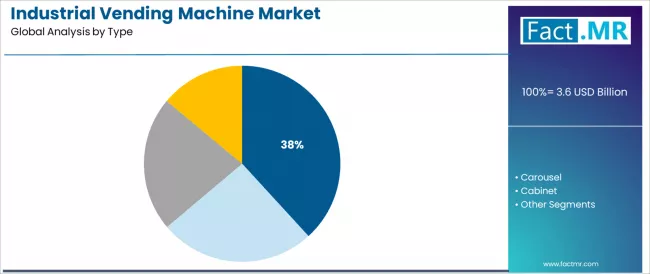
The coil vending machine segment represents the dominant force in the industrial vending machine market, capturing 38.2% of total market share in 2025. This established machine type encompasses solutions featuring versatile dispensing mechanisms and broad product compatibility capabilities, including advanced configurations supporting diverse package sizes and weight capacities that enable superior operational flexibility and deployment versatility across manufacturing facilities and industrial maintenance operations worldwide.
The coil segment's market leadership stems from its superior adaptability, with solutions capable of dispensing various consumable categories including personal protective equipment, maintenance supplies, and small tools while maintaining reliable operation and cost-effective maintenance requirements across diverse industrial environments.
The carousel vending machine segment maintains a substantial market share at 29.5%, serving facilities requiring high-density storage and automated retrieval for small parts and precision components across manufacturing and aerospace applications.
Carousel vending machines offer compact footprints for space-constrained environments while providing sufficient capacity to support operational requirements. The carousel segment demonstrates steady adoption, driven by expanding needs for organized storage systems and efficient material handling in production environments.
Within the type category, cabinet vending machines demonstrate growing adoption, driven by facility preferences for secure storage solutions and customizable internal configurations supporting specialized industrial applications. This sub-segment benefits from enhanced security features and modular design capabilities enabling tailored deployments.
Key operational advantages driving the coil segment include:
- Versatile dispensing capabilities with broad product compatibility enabling diverse consumable management across industrial categories without extensive configuration requirements
- Cost-effective deployment allowing scalable implementations and straightforward maintenance procedures across various facility sizes and operational complexities
- Proven reliability features ensuring consistent performance and minimal downtime while maintaining operational efficiency across demanding industrial environments
- Flexible configuration options providing adaptable solutions for evolving inventory requirements across manufacturing operations and facility management applications
By Product, Which Segment Accounts for the Largest Market Share?
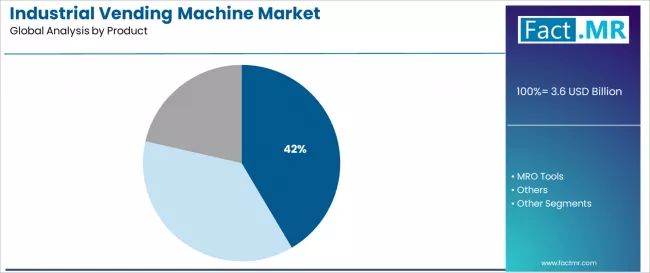
PPE dominates the industrial vending machine product landscape with a 41.5% market share in 2025, reflecting the critical role of personal protective equipment management in supporting workplace safety compliance and regulatory adherence across industrial facilities worldwide.
The PPE segment's market leadership is reinforced by mandatory safety requirements, increasing regulatory oversight, and the need for controlled distribution ensuring appropriate equipment availability while tracking usage patterns and maintaining audit trails.
Within this segment, safety gloves, protective eyewear, and respiratory protection represent the most frequently dispensed items, driven by universal safety requirements and high consumption rates across manufacturing operations. This sub-segment benefits from established compliance frameworks and continuous emphasis on worker safety programs.
The MRO tools segment represents a substantial product category at 34.0% market share, demonstrating strong growth through specialized requirements for maintenance supplies and consumable tools supporting production uptime and equipment reliability. This segment benefits from maintenance program optimization and predictive maintenance initiatives that demand efficient tool and supply management.
The others segment maintains meaningful presence through dispensing of specialized items including janitorial supplies, office consumables, and facility maintenance products, while serving specific operational requirements beyond core industrial applications.
Key market dynamics supporting product segment growth include:
- PPE segment expansion driven by stringent safety regulations and compliance documentation requirements, necessitating automated tracking and controlled distribution systems
- MRO tools category growth trends requiring inventory optimization and usage monitoring for maintenance efficiency improvements
- Integration of RFID technology and biometric authentication enabling precise user identification and accountability tracking
- Growing emphasis on sustainability initiatives driving reusable PPE programs and waste reduction through automated dispensing controls
By End-use, Which Segment Accounts for a Significant Market Share?
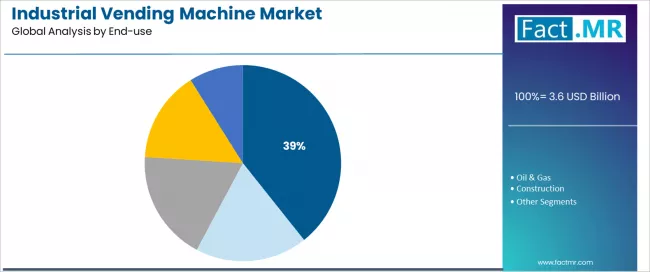
Manufacturing represents the leading end-use segment in the industrial vending machine market with a 39.3% market share in 2025, reflecting the fundamental importance of efficient consumable management in production environments and operational excellence initiatives. The manufacturing segment demonstrates consistent demand driven by the need to optimize inventory carrying costs, reduce production downtime, and maintain lean operations across diverse manufacturing operations and assembly facilities.
The oil & gas segment emerges as an important end-use category at 22.7% market share with robust growth potential, driven by remote operation requirements and safety-critical environments demanding reliable supply availability across drilling sites, refineries, and production facilities. Operations in oil and gas facilities require specialized vending solutions capable of supporting hazardous location classifications and extreme environmental conditions while maintaining strict inventory control and safety compliance.
Within end-use applications, construction demonstrates growing adoption as contractors seek to improve tool accountability and reduce equipment loss across job sites. Aerospace applications address stringent quality control requirements and traceability standards essential for regulatory compliance and production documentation.
Key end-use dynamics include:
- Manufacturing requirements accelerating across automotive, electronics, and consumer goods sectors with emphasis on lean manufacturing principles and waste reduction
- Oil & gas applications driving demand for rugged vending systems and hazardous location certifications supporting remote operations
- Construction sector prioritizing mobile vending solutions and theft prevention capabilities for tool management across distributed work sites
- Aerospace facilities emphasizing traceability features and calibration tracking for precision tools and specialized equipment management
What are the Drivers, Restraints, and Key Trends of the Industrial Vending Machine Market?
The market is driven by three concrete demand factors tied to industrial operational outcomes. First, rising emphasis on lean manufacturing and inventory optimization creates expanding facility adoption seeking efficient consumable management solutions, with automated vending systems representing a critical tool for reducing inventory carrying costs and improving material availability in production environments, requiring widespread deployment across manufacturing operations. Second, growing workplace safety regulations and PPE compliance requirements drive facility implementations and systematic adoption, with comprehensive tracking capabilities demonstrating significant benefits in regulatory adherence, audit documentation, and safety program effectiveness through automated distribution by 2030. Third, increasing labor cost pressures and efficiency initiatives enable more streamlined inventory management approaches that improve productivity while reducing manual handling and administrative overhead associated with traditional supply distribution methods.
Market restraints include high initial capital investment requirements and total cost of ownership considerations that can challenge adoption decisions and budget approvals, particularly in smaller facilities where return on investment timelines may extend beyond typical capital planning horizons and financial justification proves difficult. Integration complexity with existing enterprise resource planning systems and facility infrastructure poses another significant obstacle, as industrial vending machine implementations depend on reliable network connectivity and software compatibility, potentially affecting deployment timelines and operational readiness. Resistance to technology adoption among workforce populations and concerns about employee monitoring create additional barriers for widespread acceptance, demanding comprehensive change management initiatives and stakeholder engagement programs.
Key trends indicate accelerated cloud-based management platform adoption in developed markets, particularly North America and Europe, where facilities demonstrate willingness to invest in advanced analytics capabilities based on real-time usage data, predictive replenishment algorithms, and comprehensive reporting dashboards. IoT integration trends toward connected vending ecosystems with remote monitoring capabilities and automated ordering systems enable proactive inventory management that optimizes service levels and reduces stockout incidents. However, the market thesis could face disruption if significant advances in alternative inventory management technologies or major shifts in manufacturing approaches reduce reliance on traditional vending-based distribution strategies.
Analysis of the Industrial Vending Machine Market by Key Countries
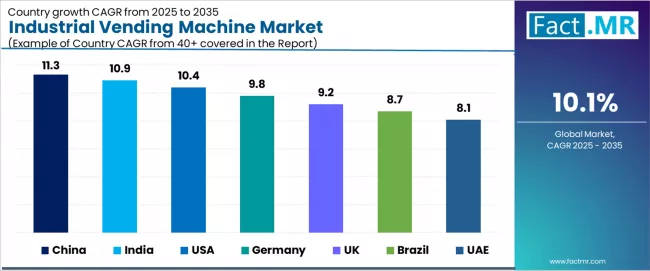
| Country | CAGR (2025-2035) |
|---|---|
| China | 11.3% |
| India | 10.9% |
| USA | 10.4% |
| Germany | 9.8% |
| UK | 9.2% |
| Brazil | 8.7% |
| UAE | 8.1% |
The global industrial vending machine market is expanding rapidly, with China leading at an 11.3% CAGR through 2035, driven by extensive manufacturing capacity expansion, smart factory initiatives, and government support for industrial automation adoption. India follows at 10.9%, supported by growing manufacturing sector investments, infrastructure development, and increasing emphasis on operational efficiency. USA records 10.4%, reflecting an established landscape with continuous innovation in IoT integration and advanced analytics capabilities.
Germany advances at 9.8%, leveraging Industry 4.0 leadership and automotive sector adoption. UK posts 9.2%, focusing on pharmaceutical manufacturing and food processing applications, while Brazil grows steadily at 8.7%, emphasizing industrial modernization and manufacturing competitiveness. UAE demonstrates 8.1% growth, anchored by oil and gas sector adoption and industrial diversification initiatives.
How is China Leading Global Market Expansion?
China demonstrates the strongest growth potential in the industrial vending machine market with a CAGR of 11.3% through 2035. The country's leadership position stems from massive manufacturing infrastructure, government-led smart factory programs, and increasing emphasis on automation technologies driving adoption of intelligent inventory management solutions.
Growth is concentrated in major industrial regions and manufacturing hubs, including Guangdong, Jiangsu, Zhejiang, and Shanghai, where facilities are increasingly implementing automated dispensing systems for comprehensive consumable management beyond traditional manual distribution approaches.
Distribution channels through industrial equipment suppliers, automation solution providers, and manufacturing technology integrators expand product accessibility across industrial parks and production facilities. The country's growing integration of domestic IoT platforms with industrial vending systems provides strong momentum for locally developed solutions, including comprehensive adoption across state-owned enterprises and private manufacturing operations seeking operational excellence.
Key market factors:
- Manufacturing facilities concentrated in coastal provinces and industrial development zones with extensive automation adoption
- E-commerce growth through platforms including Alibaba and JD.com enabling convenient industrial equipment procurement
- Comprehensive smart manufacturing initiatives, including Made in China 2025 programs with proven automation deployment capabilities
- Local manufacturing development featuring domestic suppliers offering competitively priced systems with Chinese-language interfaces
Why is India Emerging as a High-Growth Market?
In major industrial centers including Gujarat, Maharashtra, Tamil Nadu, and Karnataka, the adoption of industrial vending machine solutions is accelerating across manufacturing facilities, driven by increasing focus on operational efficiency and growing emphasis on workplace safety compliance. The market demonstrates strong growth momentum with a CAGR of 10.9% through 2035, linked to comprehensive manufacturing sector expansion trends and increasing adoption of modern inventory management practices.
Indian facilities are implementing automated dispensing systems integrated with facility management platforms to enhance consumable tracking while meeting growing expectations in lean manufacturing implementation. The country's expanding automotive and pharmaceutical manufacturing sectors create ongoing demand for reliable vending solutions, while increasing emphasis on Make in India initiatives drives adoption of technology-enabled operational improvements.
Key development areas:
- Automotive and pharmaceutical manufacturers leading industrial vending adoption with emphasis on quality control and traceability
- Distribution expansion through both industrial distributors and direct manufacturer sales networks
- Technology integration enabling mobile applications and cloud-based management systems
- Growing preference for locally supported systems addressing service requirements alongside international brands offering advanced features
What drives USA’s Market Resilience?
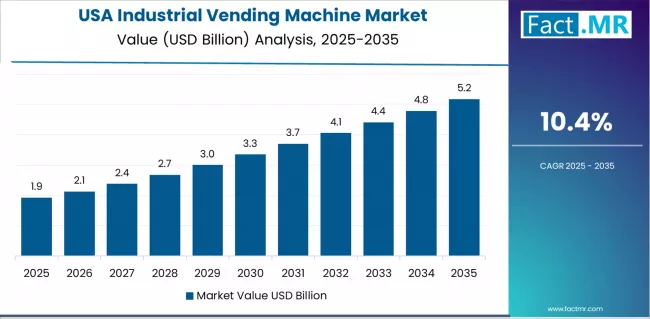
USA market expansion is driven by diverse industrial applications, including advanced manufacturing facilities in technology-conscious regions and comprehensive safety programs across traditional manufacturing segments. The country demonstrates steady growth potential with a CAGR of 10.4% through 2035, supported by continuous innovation from established vending machine manufacturers and specialized industrial automation companies.
American facilities face implementation challenges related to workforce acceptance and change management requirements, necessitating comprehensive training programs and stakeholder engagement strategies. However, established lean manufacturing adoption and high emphasis on operational metrics create stable baseline demand for industrial vending machines, particularly among facilities actively pursuing Industry 4.0 initiatives where automated inventory management drives primary investment decisions.
Market characteristics:
- Manufacturing facilities and distribution centers showing robust demand with substantial annual deployments across automotive, aerospace, and electronics sectors
- Regional preferences varying between advanced analytics emphasis in coastal technology hubs and cost-effectiveness focus in traditional manufacturing regions
- Future projections indicate continued integration with enterprise systems and artificial intelligence-enabled predictive capabilities
- Growing emphasis on vendor-managed inventory partnerships and integrated service models supporting operational continuity
How does Germany Demonstrate Industry 4.0 Leadership?
The market in Germany leads in advanced industrial automation adoption based on integration with comprehensive manufacturing execution systems and emphasis on data-driven operational optimization for enhanced production efficiency. The country shows strong potential with a CAGR of 9.8% through 2035, driven by automotive sector leadership and precision manufacturing expertise in major industrial regions, including Bavaria, Baden-Württemberg, North Rhine-Westphalia, and Lower Saxony.
German facilities are adopting industrial vending machines through integrated automation strategies and comprehensive digital transformation initiatives for complete supply chain visibility, particularly in export-oriented manufacturing operations and engineering-focused production environments demanding rigorous process control. Distribution channels through industrial automation specialists and factory equipment providers expand coverage across industrial clusters and manufacturing centers.
Leading market segments:
- Automotive manufacturing facilities in major production centers implementing comprehensive tool and consumable management systems
- Precision engineering companies achieving high integration rates with manufacturing execution systems
- Strategic collaborations between vending machine manufacturers and automation technology providers expanding capabilities
- Focus on cybersecurity standards and data protection compliance addressing Industry 4.0 requirements
What positions UK for Pharmaceutical and Food Processing Leadership?
In London, Manchester, Birmingham, and other major industrial centers, facilities are implementing industrial vending machine solutions through comprehensive safety programs and regulatory compliance frameworks, with documented case studies showing substantial operational improvements through automated PPE distribution and usage tracking. The market shows steady growth potential with a CAGR of 9.2% through 2035, linked to ongoing pharmaceutical manufacturing expansion, food processing sector modernization, and emerging advanced manufacturing initiatives in major regions.
Facilities are adopting automated vending systems with quality assurance integration to enhance traceability while maintaining standards demanded by highly regulated industries. The country's established pharmaceutical and food processing sectors create ongoing opportunities for specialized vending deployments that differentiate through regulatory compliance capabilities and audit trail functionality.
Market development factors:
- Pharmaceutical and food processing facilities leading adoption of validated vending systems across UK
- Quality assurance-driven implementations providing growth opportunities in regulated industries
- Strategic partnerships between vending suppliers and industry-specific distributors expanding market access
- Emphasis on 21 CFR Part 11 compliance and Good Manufacturing Practice integration supporting regulatory requirements
How does Brazil Show Industrial Modernization Progress?
Brazil's industrial vending machine market demonstrates growing adoption focused on manufacturing competitiveness and operational efficiency improvement, with documented integration of automated inventory systems achieving substantial cost reductions in consumable management across industrial applications.
The country maintains steady growth momentum with a CAGR of 8.7% through 2035, driven by automotive sector presence and expanding manufacturing infrastructure emphasizing productivity enhancement methodologies that align with global competitiveness requirements applied to Brazilian industrial operations.
Major industrial regions, including São Paulo, Minas Gerais, Rio de Janeiro, and Rio Grande do Sul, showcase increasing adoption of vending solutions where inventory optimization integrates seamlessly with lean manufacturing programs and comprehensive cost reduction initiatives.
Key market characteristics:
- Automotive and machinery manufacturing facilities driving demand for reliable inventory management systems
- Cost-effectiveness emphasis enabling competitive local and international supplier participation
- Technology partnerships between Brazilian distributors and international manufacturers expanding solution availability
- Focus on Portuguese-language interfaces and local technical support addressing service requirements
What characterizes UAE's Oil and Gas Sector Adoption?
In major industrial centers including Abu Dhabi, Dubai, and the Northern Emirates, the adoption of industrial vending machine solutions is expanding across oil and gas facilities and construction projects, driven by remote operation requirements and safety-critical environment management. The market demonstrates solid growth potential with a CAGR of 8.1% through 2035, linked to comprehensive industrial diversification initiatives and increasing focus on operational excellence in energy sector operations.
Facilities in the UAE are implementing rugged vending systems capable of operating in harsh environmental conditions to enhance supply availability while meeting growing expectations in safety compliance and asset tracking. The country's expanding manufacturing and logistics sectors create ongoing demand for automated dispensing solutions, while increasing emphasis on digital transformation drives adoption of connected inventory management platforms.
Key development areas:
- Oil and gas operations leading industrial vending adoption with emphasis on remote site management and safety equipment tracking
- Distribution expansion through specialized industrial suppliers and integrated facility management service providers
- Hazardous location-certified equipment supporting petrochemical and energy sector requirements
- Integration of vending systems with enterprise asset management platforms enabling comprehensive facility operations
Europe Market Split by Country
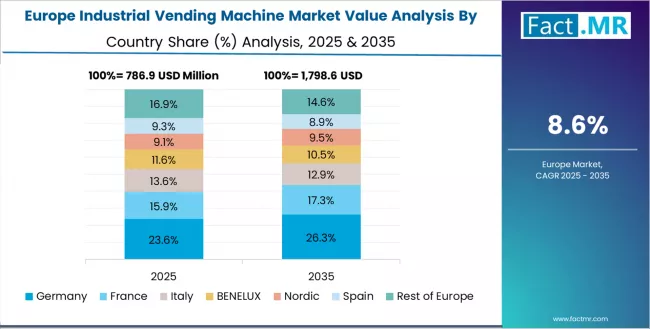
The industrial vending machine market in Europe is projected to grow from USD 0.9 billion in 2025 to USD 2.4 billion by 2035, registering a CAGR of 10.3% over the forecast period. Germany is expected to maintain its leadership position with a 32.5% market share in 2025, adjusting to 31.8% by 2035, supported by its extensive automotive manufacturing base, advanced Industry 4.0 adoption, and comprehensive industrial automation infrastructure serving major European production facilities.
UK follows with a 19.7% share in 2025, projected to reach 20.1% by 2035, driven by comprehensive pharmaceutical manufacturing growth and food processing sector modernization in major industrial regions implementing regulatory compliance solutions. France holds a 17.2% share in 2025, expected to maintain 17.5% by 2035 through ongoing development of aerospace manufacturing and chemical processing applications.
Italy commands a 13.8% share, while Spain accounts for 10.3% in 2025. The rest of Europe region is anticipated to gain momentum, expanding its collective share from 6.5% to 7.3% by 2035, attributed to increasing industrial vending adoption in Nordic manufacturing facilities and emerging Central European production sites implementing lean manufacturing practices.
Competitive Landscape of the Industrial Vending Machine Market
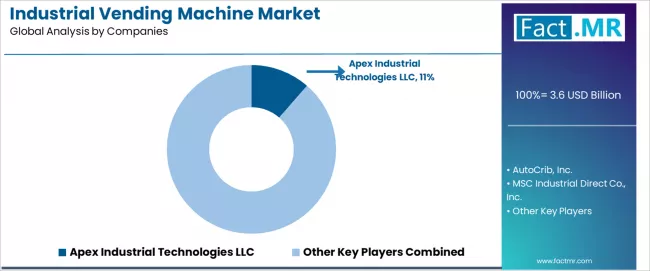
The industrial vending machine market features approximately 20-25 meaningful players with moderate concentration, where the top three companies control roughly 20-30% of global market share through established distribution networks, comprehensive product portfolios, and integrated software platforms. Competition centers on technology innovation, service capabilities, and total cost of ownership rather than hardware pricing alone.
Market leaders include Apex Industrial Technologies LLC maintaining an 11.4% market share, AutoCrib, Inc., and MSC Industrial Direct Co., Inc., which maintain competitive advantages through comprehensive industrial vending solutions, proven implementation methodologies, and deep expertise in manufacturing operations, creating high customer retention among facilities seeking reliable inventory management. These companies leverage extensive distribution partnerships and ongoing software development to defend market positions while expanding into adjacent categories including tool crib management and automated storage systems.
Challengers encompass specialized vending solution providers including Brammer, IMC Group, and SecuraStock, which compete through targeted industry applications and strong relationships with industrial distributors and facility management organizations. Industrial automation specialists, including CribMaster, Fastenal Company, and Airgas Inc., focus on specific product categories or deployment models, offering differentiated capabilities in vendor-managed inventory programs, consumable distribution services, and integrated facility solutions.
Emerging technology-focused manufacturers and regional equipment providers create competitive pressure through innovative IoT platforms and cost-effective deployment models, particularly in high-growth markets including China and India, where local manufacturing capabilities provide advantages in pricing and customization approaches.
Market dynamics favor companies that combine hardware reliability with software sophistication that addresses the complete operational workflow from inventory planning through usage analytics and automated replenishment. Strategic emphasis on cloud-based platforms, mobile applications, and artificial intelligence integration enables differentiation in increasingly technology-driven industrial environments across developed and emerging markets.
Global Industrial Vending Machine Market — Stakeholder Contribution Framework
Industrial vending machines represent a critical operational technology that enables manufacturing facilities and industrial operations to optimize inventory management and control consumable usage while improving workplace safety compliance and operational efficiency without excessive manual oversight and traditional distribution inefficiencies, typically providing automated tracking capabilities including real-time usage monitoring, employee accountability features, and predictive replenishment alerts compared to conventional methods alone while ensuring improved cost control and comprehensive visibility outcomes.
With the market projected to grow from USD 3.6 billion in 2025 to USD 9.4 billion by 2035 at a 10.1% CAGR, these solutions offer compelling advantages for manufacturing applications, PPE management, and diverse industrial operations seeking technology-enabled inventory optimization. Scaling market penetration and widespread adoption requires coordinated action across technology development, industry standards, equipment manufacturers, industrial distributors, and facility management organizations.
How Could Governments Spur Local Development and Adoption?
- Industrial Modernization Programs: Include automated inventory management in manufacturing competitiveness initiatives, providing targeted support for technology adoption in small and medium enterprises and supporting pilot programs through development grants and demonstration projects.
- Tax Policy & Investment Support: Implement accelerated depreciation schedules for industrial automation equipment, provide tax incentives for companies investing in lean manufacturing technologies and workplace safety systems, and establish favorable import duty structures that encourage advanced equipment procurement over conventional alternatives.
- Standards & Safety Framework Development: Create guidelines for vending machine integration in industrial environments across workplace safety applications, establish interoperability standards and data exchange protocols for enterprise system integration, and develop workplace safety compliance recognition that acknowledges automated distribution benefits.
- Workforce Development & Training: Fund vocational programs addressing industrial automation and smart manufacturing technologies, invest in facility management training initiatives that incorporate modern inventory control systems, and support workforce transition programs addressing technology adoption concerns.
- Innovation & Research Support: Establish public-private partnerships for industrial IoT development, support collaborative research investigating predictive analytics and artificial intelligence applications, and create regulatory environments that encourage innovation in connected manufacturing technologies.
How Could Industry Bodies Support Market Development?
- Technology Standards & Interoperability: Define standardized communication protocols for vending machine integration across enterprise resource planning and manufacturing execution systems, establish universal data formats and API specifications, and create industry guidelines that facilitate multi-vendor deployments.
- Market Education & Best Practices: Lead messaging that demonstrates industrial vending benefits, emphasizing return on investment quantification, implementation methodologies, and realistic deployment timelines compared to manual distribution approaches.
- Safety & Compliance Guidelines: Develop frameworks for PPE vending implementation, hazardous location deployments, and regulatory compliance documentation, ensuring workplace safety across installation and operation activities.
- Professional Development: Run certification programs for facility managers, maintenance supervisors, and procurement professionals on optimizing vending deployments, inventory optimization strategies, and change management approaches in diverse industrial settings.
How Could Manufacturers and Technology Players Strengthen the Ecosystem?
- Advanced Product Development: Develop next-generation industrial vending systems with enhanced IoT connectivity, artificial intelligence-enabled analytics, and modular configurations that support diverse deployment scenarios while reducing total cost of ownership and improving user experience.
- Software Platform Innovation: Provide comprehensive cloud-based management systems, mobile applications, and predictive analytics tools that support data-driven decision making and enterprise integration.
- Customer Success Programs: Offer implementation support, training services, and ongoing optimization consultation that help facilities maximize return on investment and achieve operational targets.
- Research & Development Networks: Build comprehensive R&D capabilities, collaborative innovation programs, and pilot testing facilities that ensure industrial vending solutions maintain high reliability standards and meet evolving customer requirements.
How Could Industrial Distributors and Service Providers Navigate the Market?
- Comprehensive Solution Delivery: Incorporate industrial vending systems into broader facility management offerings, with particular focus on integrated inventory optimization, vendor-managed inventory programs, and comprehensive consumable management for holistic operational support.
- Implementation Excellence: Establish proven deployment methodologies addressing site assessment, system configuration, network integration, and employee training through optimized project management frameworks and customer success protocols.
- Service & Support Networks: Implement responsive maintenance programs combining remote monitoring, preventive maintenance schedules, and rapid response capabilities that ensure continuous system availability and customer satisfaction.
- Performance Optimization Services: Develop consulting capabilities addressing usage analytics, inventory optimization, and continuous improvement initiatives that enable customers to maximize operational benefits.
How Could Investors and Financial Enablers Unlock Value?
- Technology Development Financing: Provide growth capital for established companies like Apex Industrial Technologies LLC, AutoCrib, and emerging technology providers to fund IoT platform development and artificial intelligence integration initiatives.
- Innovation Investment: Back startups developing advanced analytics solutions, blockchain-enabled supply chain platforms, and next-generation dispensing technologies that enhance operational capabilities and market differentiation.
- Market Expansion Funding: Finance distribution network expansion strategies for vending manufacturers establishing operations in high-growth regions including China and India, supporting localization initiatives that address market-specific requirements.
- Strategic Acquisition Support: Enable consolidation opportunities that combine hardware manufacturing with software platforms, creating comprehensive solution providers with enhanced competitive positioning.
Key Players in the Industrial Vending Machine Market
- Apex Industrial Technologies LLC
- AutoCrib, Inc.
- MSC Industrial Direct Co., Inc.
- Brammer
- IMC Group
- SecuraStock
- CribMaster
- Fastenal Company
- Airgas Inc.
- IVM, Inc.
Scope of the Report
| Items | Values |
|---|---|
| Quantitative Units | USD 3.6 Billion |
| Type | Carousel, Coil, Cabinet, Others |
| Product | PPE, MRO Tools, Others |
| End-use | Manufacturing, Oil & Gas, Construction, Aerospace, Other |
| Regions Covered | Asia Pacific, Europe, North America, Latin America, Middle East & Africa |
| Country Covered | China, India, USA, Germany, UK, Brazil, UAE, and 40+ countries |
| Key Companies Profiled | Apex Industrial Technologies LLC, AutoCrib, Inc., MSC Industrial Direct Co., Inc., Brammer, IMC Group, SecuraStock, CribMaster, Fastenal Company, Airgas Inc., IVM, Inc. |
| Additional Attributes | Dollar sales by type and product categories, regional adoption trends across Asia Pacific, Europe, and North America, competitive landscape with vending machine manufacturers and industrial distribution companies, product specifications and integration requirements, connectivity with enterprise resource planning and manufacturing execution systems, innovations in IoT platforms and predictive analytics capabilities, and development of specialized applications with industry-specific compliance and operational efficiency features. |
Industrial Vending Machine Market by Segments
-
Type :
- Carousel
- Coil
- Cabinet
- Others
-
Product :
- PPE
- MRO Tools
- Others
-
End-use :
- Manufacturing
- Oil & Gas
- Construction
- Aerospace
- Others
-
Region :
- Asia Pacific
- China
- Japan
- South Korea
- India
- Australia
- Thailand
- Rest of Asia Pacific
- Europe
- Germany
- UK
- France
- Italy
- Spain
- Denmark
- Sweden
- Norway
- Rest of Europe
- North America
- USA
- Canada
- Mexico
- Latin America
- Brazil
- Argentina
- Rest of Latin America
- Middle East & Africa
- South Africa
- Saudi Arabia
- UAE
- Kuwait
- Rest of Middle East & Africa
- Asia Pacific
Table of Content
- Executive Summary
- USA Market Outlook
- Demand to side Trends
- Supply to side Trends
- Technology Roadmap Analysis
- Analysis and Recommendations
- Market Overview
- Market Coverage / Taxonomy
- Market Definition / Scope / Limitations
- Market Background
- Market Dynamics
- Drivers
- Restraints
- Opportunity
- Trends
- Scenario Forecast
- Demand in Optimistic Scenario
- Demand in Likely Scenario
- Demand in Conservative Scenario
- Opportunity Map Analysis
- Product Life Cycle Analysis
- Supply Chain Analysis
- Investment Feasibility Matrix
- Value Chain Analysis
- PESTLE and Porter’s Analysis
- Regulatory Landscape
- Regional Parent Market Outlook
- Production and Consumption Statistics
- Import and Export Statistics
- Market Dynamics
- USA Market Analysis 2020 to 2024 and Forecast, 2025 to 2035
- Historical Market Size Value (USD Million) Analysis, 2020 to 2024
- Current and Future Market Size Value (USD Million) Projections, 2025 to 2035
- Y to o to Y Growth Trend Analysis
- Absolute $ Opportunity Analysis
- USA Market Pricing Analysis 2020 to 2024 and Forecast 2025 to 2035
- USA Market Analysis 2020 to 2024 and Forecast 2025 to 2035, By Type
- Introduction / Key Findings
- Historical Market Size Value (USD Million) Analysis By Type, 2020 to 2024
- Current and Future Market Size Value (USD Million) Analysis and Forecast By Type, 2025 to 2035
- Coil
- Carousel
- Cabinet
- Others
- Y to o to Y Growth Trend Analysis By Type, 2020 to 2024
- Absolute $ Opportunity Analysis By Type, 2025 to 2035
- USA Market Analysis 2020 to 2024 and Forecast 2025 to 2035, By Product
- Introduction / Key Findings
- Historical Market Size Value (USD Million) Analysis By Product, 2020 to 2024
- Current and Future Market Size Value (USD Million) Analysis and Forecast By Product, 2025 to 2035
- PPE
- MRO Tools
- Others
- Y to o to Y Growth Trend Analysis By Product, 2020 to 2024
- Absolute $ Opportunity Analysis By Product, 2025 to 2035
- USA Market Analysis 2020 to 2024 and Forecast 2025 to 2035, By End-use
- Introduction / Key Findings
- Historical Market Size Value (USD Million) Analysis By End-use, 2020 to 2024
- Current and Future Market Size Value (USD Million) Analysis and Forecast By End-use, 2025 to 2035
- Manufacturing
- Oil & Gas
- Construction
- Aerospace
- Others
- Y to o to Y Growth Trend Analysis By End-use, 2020 to 2024
- Absolute $ Opportunity Analysis By End-use, 2025 to 2035
- USA Market Analysis 2020 to 2024 and Forecast 2025 to 2035, By Region
- Introduction
- Historical Market Size Value (USD Million) Analysis By Region, 2020 to 2024
- Current Market Size Value (USD Million) Analysis and Forecast By Region, 2025 to 2035
- USA
- Market Attractiveness Analysis By Region
- USA Market Analysis 2020 to 2024 and Forecast 2025 to 2035, By Country
- Historical Market Size Value (USD Million) Trend Analysis By Market Taxonomy, 2020 to 2024
- Market Size Value (USD Million) Forecast By Market Taxonomy, 2025 to 2035
- By Country
- By Type
- By Product
- By End-use
- Market Attractiveness Analysis
- By Country
- By Type
- By Product
- By End-use
- Key Takeaways
- Market Structure Analysis
- Competition Dashboard
- Competition Benchmarking
- Market Share Analysis of Top Players
- By Regional
- By Type
- By Product
- By End-use
- Competition Analysis
- Competition Deep Dive
- Apex Industrial Technologies LLC
- Overview
- Product Portfolio
- Profitability by Market Segments (Product/Age /Sales Channel/Region)
- Sales Footprint
- Strategy Overview
- Marketing Strategy
- Product Strategy
- Channel Strategy
- AutoCrib, Inc.
- MSC Industrial Direct Co., Inc.
- Brammer
- IMC Group
- SecuraStock
- CribMaster
- Fastenal Company
- Airgas Inc.
- IVM, Inc.
- Apex Industrial Technologies LLC
- Competition Deep Dive
- Assumptions & Acronyms Used
- Research Methodology
List Of Table
- Table 1: USA Market Value (USD Million) Forecast by Region, 2020 to 2035
- Table 2: USA Market Value (USD Million) Forecast by Type , 2020 to 2035
- Table 3: USA Market Value (USD Million) Forecast by Product, 2020 to 2035
- Table 4: USA Market Value (USD Million) Forecast by End-use, 2020 to 2035
- Table 5: USA Market Value (USD Million) Forecast by Country, 2020 to 2035
- Table 6: USA Market Value (USD Million) Forecast by Type , 2020 to 2035
- Table 7: USA Market Value (USD Million) Forecast by Product, 2020 to 2035
- Table 8: USA Market Value (USD Million) Forecast by End-use, 2020 to 2035
List Of Figures
- Figure 1: USA Market Pricing Analysis
- Figure 2: USA Market Value (USD Million) Forecast 2025 to 2035
- Figure 3: USA Market Value Share and BPS Analysis by Type, 2025 and 2035
- Figure 4: USA Market Y to o to Y Growth Comparison by Type, 2025 to 2035
- Figure 5: USA Market Attractiveness Analysis by Type
- Figure 6: USA Market Value Share and BPS Analysis by Product, 2025 and 2035
- Figure 7: USA Market Y to o to Y Growth Comparison by Product, 2025 to 2035
- Figure 8: USA Market Attractiveness Analysis by Product
- Figure 9: USA Market Value Share and BPS Analysis by End-use, 2025 and 2035
- Figure 10: USA Market Y to o to Y Growth Comparison by End-use, 2025 to 2035
- Figure 11: USA Market Attractiveness Analysis by End-use
- Figure 12: USA Market Value (USD Million) Share and BPS Analysis by Region, 2025 and 2035
- Figure 13: USA Market Y to o to Y Growth Comparison by Region, 2025 to 2035
- Figure 14: USA Market Attractiveness Analysis by Region
- Figure 15: USA Market Incremental Dollar Opportunity, 2025 to 2035
- Figure 16: USA Market Value Share and BPS Analysis by Country, 2025 and 2035
- Figure 17: USA Market Value Share and BPS Analysis by Type, 2025 and 2035
- Figure 18: USA Market Y to o to Y Growth Comparison by Type, 2025 to 2035
- Figure 19: USA Market Attractiveness Analysis by Type
- Figure 20: USA Market Value Share and BPS Analysis by Product, 2025 and 2035
- Figure 21: USA Market Y to o to Y Growth Comparison by Product, 2025 to 2035
- Figure 22: USA Market Attractiveness Analysis by Product
- Figure 23: USA Market Value Share and BPS Analysis by End-use, 2025 and 2035
- Figure 24: USA Market Y to o to Y Growth Comparison by End-use, 2025 to 2035
- Figure 25: USA Market Attractiveness Analysis by End-use
- Figure 26: USA Market - Tier Structure Analysis
- Figure 27: USA Market - Company Share Analysis
- FAQs -
How big is the industrial vending machine market in 2025?
The global industrial vending machine market is estimated to be valued at USD 3.6 billion in 2025.
What will be the size of industrial vending machine market in 2035?
The market size for the industrial vending machine market is projected to reach USD 9.4 billion by 2035.
How much will be the industrial vending machine market growth between 2025 and 2035?
The industrial vending machine market is expected to grow at a 10.1% CAGR between 2025 and 2035.
What are the key product types in the industrial vending machine market?
The key product types in industrial vending machine market are coil, carousel, cabinet and others.
Which product segment to contribute significant share in the industrial vending machine market in 2025?
In terms of product, ppe segment to command 41.5% share in the industrial vending machine market in 2025.